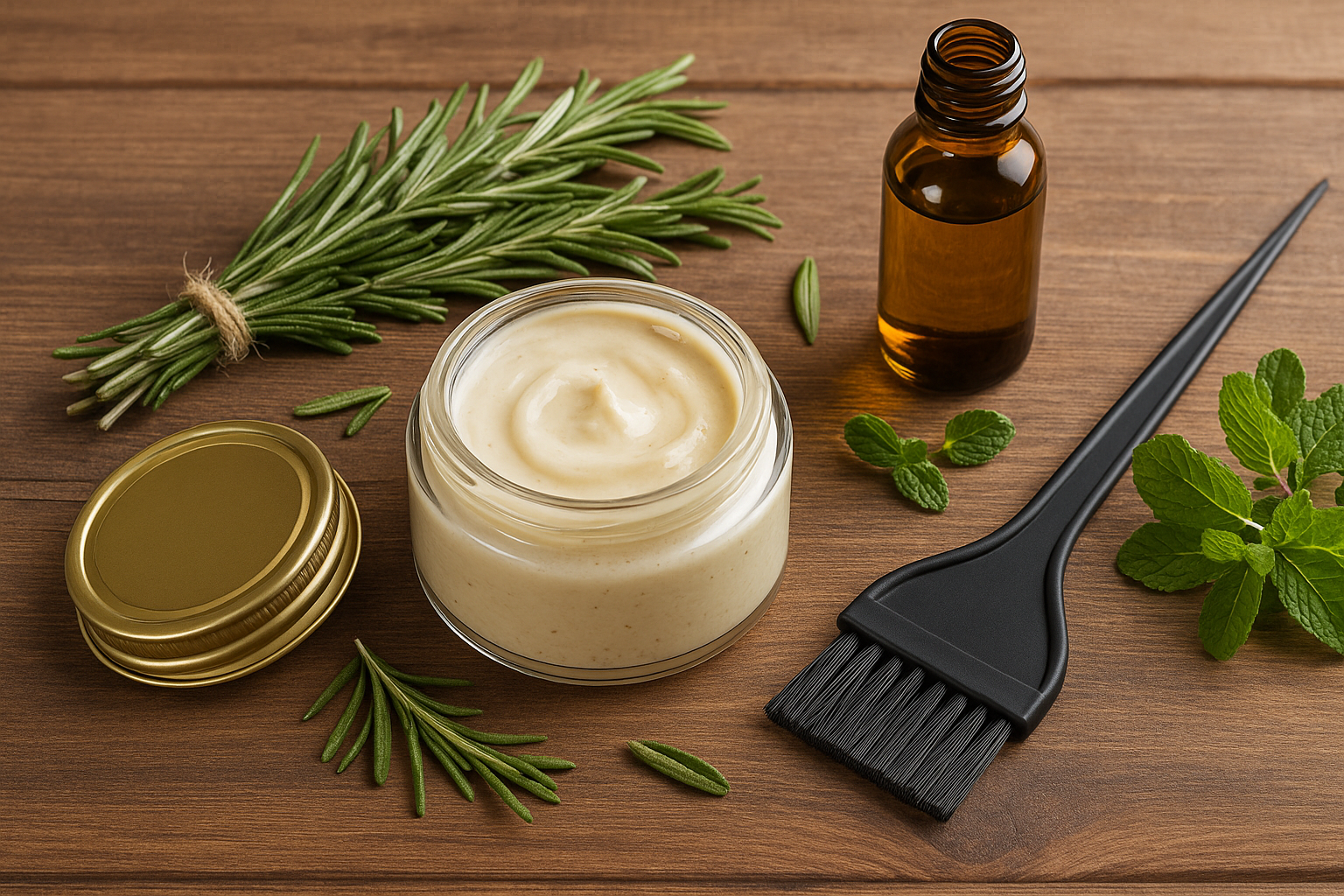Hair care is one of the fastest-growing beauty markets in the world. Shampoos, conditioners, and treatments promise shine, growth, and strength.
Yet many of these products rely on silicones, sulfates, and synthetic fragrances that give temporary results but can damage hair in the long run.
Over time, these ingredients strip natural oils, weaken strands, and create buildup on the scalp.
An alternative is to return to natural hair masks made with herbs and oils. These recipes, inspired by traditional practices, provide nutrients that restore balance, strengthen roots, and nourish the scalp.
They are customizable, inexpensive, and easy to prepare at home with simple ingredients. From rosemary and marcela to coconut and olive oil, each plant adds unique benefits.
This guide explains how to design effective natural hair masks, the role of herbs and oils, and how to adapt recipes for dry, oily, damaged, or normal hair.
You will also learn traditional uses of herbs in hair care, common mistakes to avoid, and answers to frequent questions.
Why natural masks work
Hair is made of keratin, a protein that can be weakened by heat, pollution, and chemical treatments. Natural oils replenish lipids, herbs stimulate circulation, and plant extracts provide antioxidants.
Unlike synthetic conditioners that coat the hair temporarily, natural masks penetrate deeply, nourishing both scalp and strands.
Benefits of DIY hair masks
They avoid harsh chemicals and are safer for sensitive scalps. They are cheaper than salon treatments. They can be adjusted for individual needs. They reduce waste by using reusable containers and kitchen ingredients. They revive traditional herbal knowledge passed through generations.
Key herbs for hair health
Rosemary
Stimulates circulation, encourages growth, and strengthens follicles.
Marcela
Calms scalp irritation and reduces dandruff.
Sage
Balances oil production and darkens graying hair naturally.
Chamomile
Brightens blonde tones and soothes scalp.
Carqueja
Strengthens hair roots and prevents breakage.
Mint
Refreshing, reduces itchiness, and stimulates follicles.
Key oils for hair health
Coconut oil
Deep moisturizer, penetrates hair shaft.
Olive oil
Rich in vitamin E and antioxidants.
Almond oil
Light, nourishing, and easily absorbed.
Castor oil
Stimulates growth and thickens strands.
Jojoba oil
Balances scalp oils and hydrates.
Basic formula for a natural hair mask
2 tbsp carrier oil + 1 tbsp herb infusion or powder + 5 drops essential oil. Apply to scalp and hair, leave for 30–60 minutes, then rinse with mild shampoo.
Recipes for dry hair
Coconut-Marcela Repair Mask
- 2 tbsp coconut oil
- 1 tbsp marcela infusion
- 5 drops lavender oil
Moisturizes dry hair and soothes itchy scalp.
Olive-Honey Nourishment Mask
- 2 tbsp olive oil
- 1 tbsp honey
- 1 tbsp chamomile tea
Restores softness and shine.
Almond-Oat Soothing Mask
- 2 tbsp almond oil
- 1 tbsp oat flour
- 5 drops chamomile oil
Hydrates while calming scalp irritation.
Recipes for oily hair
Clay-Rosemary Balance Mask
- 2 tbsp green clay
- 1 tbsp rosemary infusion
- 5 drops lemon oil
Absorbs excess oil and stimulates circulation.
Mint-Jojoba Refreshing Mask
- 2 tbsp jojoba oil
- 1 tbsp mint tea
- 5 drops peppermint oil
Refreshes scalp and balances sebum.
Carqueja-Lemon Purifying Mask
- 2 tbsp lemon juice
- 1 tbsp carqueja infusion
- 5 drops sage oil
Cleanses scalp and reduces greasiness.
Recipes for damaged hair
Castor-Rosemary Growth Mask
- 2 tbsp castor oil
- 1 tbsp rosemary tea
- 5 drops rosemary oil
Stimulates growth and repairs weak strands.
Coconut-Avocado Strength Mask
- 2 tbsp coconut oil
- ½ avocado mashed
- 5 drops sage oil
Rich in fatty acids to restore damaged hair.
Olive-Yogurt Repair Mask
- 2 tbsp olive oil
- 2 tbsp yogurt
- 5 drops lavender oil
Adds protein and hydration to brittle strands.
Recipes for normal hair
Balanced Herbal Mask
- 2 tbsp almond oil
- 1 tbsp marcela infusion
- 5 drops orange oil
Keeps hair healthy and shiny.
Chamomile-Lemon Shine Mask
- 2 tbsp chamomile tea
- 1 tbsp lemon juice
- 1 tbsp honey
Brightens tone and enhances gloss.
Jojoba-Rosemary Daily Care Mask
- 2 tbsp jojoba oil
- 1 tbsp rosemary infusion
- 5 drops rosemary oil
Maintains balance and prevents breakage.
How to apply hair masks correctly
Wash hair lightly before applying masks so oils and herbs penetrate better. Apply from scalp to ends, massaging roots for circulation. Cover with shower cap and warm towel to enhance absorption. Leave on for 30–60 minutes. Rinse with mild shampoo. Use once a week for best results.
Traditional roots of hair care with herbs
In Gaúcho culture, rosemary rinses were used after washing to strengthen hair. Marcela teas calmed irritated scalps and added shine. Sage was boiled and applied to darken gray strands. These traditions connected personal care with nature’s cycles. By making masks with the same herbs today, you continue a legacy of natural beauty.
Mistakes to avoid
Do not overload essential oils, as they can irritate skin. Do not apply masks to dirty hair, which blocks absorption. Do not leave masks overnight, as oils may weigh hair down. Do not expect instant miracles; consistent use builds results.
Designing a natural hair routine
Weekly
Choose mask based on your main need: hydration, oil balance, or repair.
Monthly
Alternate between different recipes to cover all aspects of hair health.
Seasonal
Use mint and lemon in summer, marcela and coconut in winter, rosemary in autumn, and chamomile in spring.
Frequently Asked Questions
Can I use these masks on colored hair?
Yes, but avoid strong lemon juice masks if you want to maintain dark colors. Chamomile and lemon lighten tones naturally.
Do these masks replace conditioner?
They complement conditioner but do not replace it entirely. Use them weekly as deep treatments.
How long should I leave a mask on?
Thirty to sixty minutes is ideal. Longer does not always mean better, as oils may saturate strands.
Can I store leftover masks?
Masks with only oils last weeks, but those with fresh fruit or yogurt should be used immediately to avoid spoilage.
Are essential oils necessary?
Not always. Infusions and carrier oils alone can nourish hair. Essential oils add extra therapeutic effect and fragrance.
Do natural masks really help with hair growth?
Yes. Ingredients like rosemary, castor oil, and peppermint stimulate circulation in the scalp, which supports healthy growth.
What is the best mask for dandruff?
Marcela with coconut oil calms irritation, while rosemary reduces fungal growth.
Can children use these masks?
Yes, but use mild oils like chamomile or coconut, and avoid strong essential oils.
Conclusion
DIY natural hair masks made with herbs and oils are safe, affordable, and highly effective. They nourish hair from root to tip, treat dryness, balance oil, repair damage, and maintain natural shine.
By using ingredients like rosemary, marcela, sage, chamomile, and oils such as coconut, olive, and castor, you create treatments that rival commercial products while preserving cultural traditions.
These masks prove that beauty does not need chemicals or expensive salon visits. With a few kitchen ingredients, you can design personalized care that strengthens hair and honors the wisdom of nature.

Marcela Cardozo is passionate about Southern Brazilian traditions and the cultural stories carried through natural scents. She blends knowledge of native herbs, essential oils, and regional rituals to create practical and inspiring content. Her writing connects ancestral wisdom with modern living, offering readers simple ways to bring authenticity, well-being, and meaning into their everyday lives.
